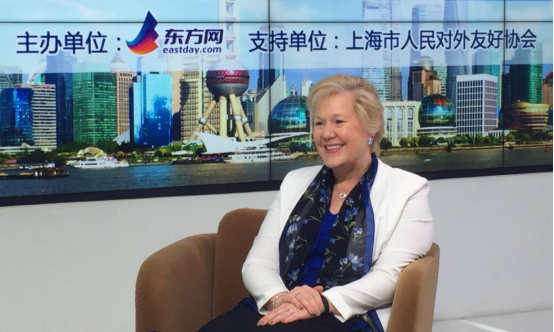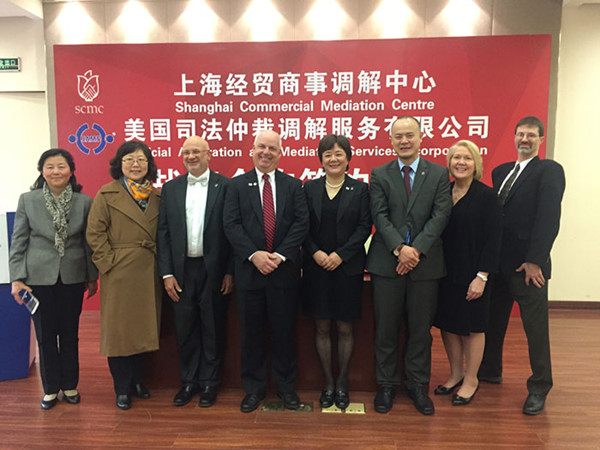American lawyer dedicated to Chinese law industry for 13 years
Elegant and affable is the first impression Meg Utterback, an American female lawyer, makes on us. Meg came to China to study in the 1980s. After graduation she went back to America. Many years later, she returned to China and has been working and living here for more than ten years.

Meg has an interview with Eastday
13 years of witnessing the development of Chinese law
In the late 1970s, China began to gradually open its door. The first Sino-foreign Joint Venture Law was promulgated in 1979. The surge of foreign investment in China led Meg to feel that this would be a time of great change, so she was determined to go to China to study and research in the law field. After graduating from McGill University in 1985, she came to China’s Renmin University, where she spent two years doing graduate studies.
The simple life is Meg’s deepest memory of her graduate student life in China. She explained that everything in the school was simple. Supplies were scarce in the whole of Beijing and there were very few cars. People rode bikes or got on the public buses."Today's material goods are very rich. I can drive a BMW and go to any nice restaurant I want to and order all types of food. And in 1985, if you went to a restaurant, you would say 'I want this and that' and they would say,'we don’t have this, we don’t have that. We have tomato only' she smiled, with the words full of reminiscence.
After graduating from Renmin University in 1987, Meg returned to the United States. In 2005, since the US law firm she was working for planned to open a representative office in Shanghai, she was fortunate to be appointed here as the person in charge. Five years later, she made another major decision to join a Chinese law firm, King & Wood Law Firm."I never thought that China would develop so fast, and I could be so successful in the Chinese legal profession as a foreign lawyer," Meg said sincerely.
Besides being a partner at King & Wood, Meg has another identity in the Chinese legal profession, asone of the foreign mediators of the Shanghai Commercial Mediation Center, where her work is mainly to resolve international commercial disputes, currently serving the “Belt and Road”.
Meg, who loves China, hopes to become a “bridge” between Chinese customers and the foreign side. She explained her role in a Chinese law firm.“Since I am working fora Chinese law firm, I can combine my international vision with the understanding of many Chinese colleagues on Chinese corporate culture, thus serving Chinese companies’internationalization.”
Meg is highly qualified. She has represented US, European and Chinese companies at the International Chamber of Commerce, the China International Economic and Trade Arbitration Commission, the Hong Kong International Arbitration Centre, the Indian Council of Arbitration and in litigation before US courts in construction and commercial disputes.
She has been involved in a number of high profile arbitrations and litigations throughout China, and has assisted with asset tracing and enforcement of foreign arbitral awards. She has written numerous book chapters and articles regarding the management of evidence and the conduct of negotiations and hearing procedures for Chinese civil proceedings and China-related cross border disputes.
Speaking of her 13 years of experience in the Chinese legal industry, she is very excited."It can be said that I have witnessed the development of Chinese law and saw many gratifying changes in the legal profession. Today, lawyers are involved in the cases more timely. The provisions of the law are also more detailed. The judicial reform makes the profession of lawyers more meaningful.”
"In the past 13 years, I have seen the Chinese legal system is becoming more complex, lawyers are becoming more professional, and people are increasingly trusting the court. People’s legal awareness is also increasing. Ten years ago, you had a two-page contract and then a handshake. Today, people expect more from their contracts, they want to protect their legal rights and they are thinking in those ways. We didn’t have that 10 years ago."
As Meg mentioned, reform and opening up has caused China to undergo earth-shaking changes in a very short period of time. It is not only the achievements of reforms, but also the speed of reforms, especially the innovation in law.
Since opening up gives rise to increased international economic and trade cooperation, domestic dispute resolution methods are no longer adequate to settle international economic cooperation disputes. Therefore, China introduced a diversified dispute resolution mechanism (ADR) in its judicial reform. Established in 2011, the first independent third-party commercial mediation organization in mainland China, the Shanghai Commercial Mediation Center, is China's most iconic ADR institution.
“China's judicial reform has improved Chinese courts and laws. The establishment of the Shanghai Commercial Mediation Centeris a great measure for companies to find a quick and effective way to resolve disputes,” Meg said.
In November 2013, the Shanghai Commercial Mediation Center was invited to settle in the Shanghai Pilot Free Trade Zone. At the invitation of the Mediation Center, world-renowned mediation agencies from the UK, EU, Singapore and other places jointly established the International Commercial Joint Mediation Court, creating a new mediation mechanism.“In the Shanghai Pilot Free Trade Zone, foreign law firms can enjoy ventures with local law firms. Look at me, I am a foreigner and I am able to work in a Chinese firm. Chinese lawyers can work with their foreign colleagues and learn from other legal systems. All these are the influences reform and opening up has brought.”
Moreover, the mediation center also cooperates with a number of internationally renowned mediation organizations including the Hong Kong International Arbitration Centre, the Hong Kong Mediation Council, the Singapore Mediation Center, the AIA European Network of Mediation Centre, the Centre for Effective Dispute Resolution (CEDR), and the Judicial Arbitration and Mediation Services (JAMS).

On March 21, 2016, the Shanghai Commercial Mediation Center (SCMC) and the US Judicial Arbitration and Mediation Service (JAMS) signed a strategic cooperation agreement in Lujiazui in Shanghai.
Meg specifically cited the cooperation between SCMC and JAMS,“The decision by SCMC to partner with JAMS continues China’s pattern of learning and studying Western practices while still being uniquely China. I think working with the strategic cooperation agreement is a benefit to both sides.”
Meeting endless opportunities in the next 40 years
As a mediator dealing with China's “Belt and Road” cases, Meg has a sense of mission. She once said that her biggest goal is to help Chinese young lawyers mature. She was proud to have served as the coach for the Shanghai Jiaotong University Moot Court team, and personally instructed and trained young lawyers of King & Wood.
In her honest words,“I want to educate the young generation of lawyers to realize that the significance of this profession is not only to make money. And working as a lawyer not only includes sending e-mails and writing contracts, but is also to keep a solemn sense of responsibility in mind and to think more about developing Chinese laws and contributing to society.”
For the current deepening of reform and opening up in China, she is excited to see the new development of the law in resolving "Belt and Road" disputes. For example, in October 2017, the China International Economic and Trade Arbitration Commission (CIETAC) implemented the International Investment Dispute Arbitration Rules, being China's first international investment arbitration rule set. Since the investment law systemsof most countries along the “Belt and Road” are not perfect, there is a high possibility of international investment disputes. This arbitration rule provides institutional guarantee for Chinese investors to invest abroad and also trustworthy investment dispute arbitration services for foreign investors investing in China. Thus, it has taken a solid step towards creating a more international, legalized and convenient business environment in and outwith China.
Moreover, first and second international commercial courts will be set up separately in Shenzhen and Xi'an to solve the cross-border commercial disputes related to the Belt and Road.“China has the potential to establish credible and reliable means to adjudicate international disputes. Ultimately, I hope to see more international disputes being adjudicated in China with foreign parties confident in those systems to provide fair and independent awards.”
When asked about the future development in the Chinese legal industry, Meg said modestly that she is still trying to achieve things in China.“We have had 40 years of reform, and we have another 40 years ahead. There is a future. Hopefully young lawyers contribute because I am helping to train them.”
In Meg’s view, China is full of opportunities, and Shanghai is more like a city of dreams.“There is nothing that can't be realized here.”
She simply wrote down “Technology advancement leaps” in capital letters to express her expectations.“I think they are the next step. China will really focus on things like artificial intelligence, development of software, and all the amazing things we would be able to do, because of the talent of companies like Tencent and Alibaba. These things have been translated into everyday life. They will do the same thing in our lifestyle that I saw happen in the past thirty years.”

Meg’s expectation of China’s continued journey of reform and opening up.
